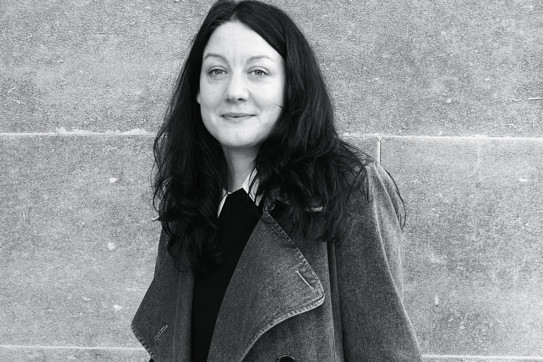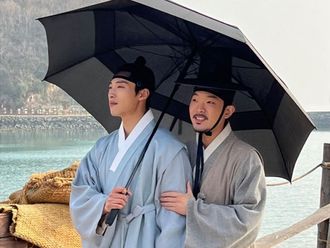
As someone who started her writing career with poetry back in the early 1990s, then went on to become a historian, naturalist, illustrator and a professional falconer, the strikingly unconventional polymath Helen Macdonald has two sides to her life.
“Birds and falconry on one hand and literature and history on the other. What’s nice about ‘H is for Hawk’ is that it’s let me bring those two sides together.” It’s a story she felt compelled to tell.
“H is for Hawk”, which challenged conventional classification, is a hybrid of a book — a blend of nature writing and memoir as well as a mini-biography of another hawk enthusiast, the fantasy writer T.H. White that won her the Samuel Johnson Prize, the UK’s most prestigious honour for nonfiction writing, and the Costa Book Award. It spent more than two months on the “New York Times” bestsellers list after it was released in the US last March.
With this book, Macdonald, who believes in the idea that embracing wildness soothes human trauma, added her name to England’s celebrated tradition of nature writers. “There’s a huge renaissance in nature writing in the UK at the moment and I’m thrilled to be a part of it. And yes, for as long as I can remember I’ve been drawn to the natural world and wild creatures,” she says.
Admittedly, writing “H is for Hawk” has been a transformative experience for the writer, on many levels.
“The book is partly about my beautiful goshawk Mabel, but is also about a very dark time in my life, the year of my father’s death, so writing it was sometimes very emotionally taxing. The book’s international success has been astonishing to me. I never expected it to be read by so many people. It’s very humbling, and it’s been life-changing.”
When her father, the Fleet Street photographer Alisdair Macdonald, died unexpectedly in 2007, her world fell apart. Laden with grief, she retreated to her home in Cambridge, and night after night she dreamt of goshawk, until she adopted Mabel. The writer, who was 37 then, spent countless hours alone in the wild as Mabel hunted for prey — it was her way of coping with her loss, struggling with her own demons.
“My rather eccentric way of dealing with grief was to run away from the world of humans to live with a bird of prey, and try to see the world through her eyes. I wanted to be as solitary, self-possessed and free from human emotion as my hawk,” she says.
Understandably, bereavement is a lonely trauma, but her highly quixotic grieving process, in which the training of Mabel takes on a vicariously redemptive quality, troubled her loved ones. “My friends and family were worried about me, but they were compassionate and wise enough to understand that it was something I had to do, to get through, and come out the other side. I’m really grateful to them for that.”
Is she a different person now? “Yes. I’m wiser, I think, certainly older, and kinder, I hope. You never get over a big grief. It just becomes part of who you are.” She still misses her father. “He was a dear friend, as well as being my dad.”
Her father, known for taking the iconic photograph of Prince Charles and Princess Diana kissing on the balcony of Buckingham Palace after their wedding, also loved nature, and shaped Macdonald’s interest in wild things.
“My father was an exceptionally brilliant photojournalist. He was interested in nature — he had a huge collection of field guides and identification manuals — and we used to go out on nature walks together, both clutching binoculars. I had a happy childhood. He taught me to be observant, to keep an interested eye on the world around me.”
But she never wanted to be a photographer. “I painted, and drew, and played with words. That was my thing,” she says.
Macdonald also misses Mabel “enormously”. It died in 2012 of an airborne fungal infection called aspergillosis. “The infection took her away horribly swiftly. I cried my eyes out. But the grief I have for her is strong and simple. She taught me a lot about life and death, about how short all our lives are, and how suddenly they can end.”
Now, she has a parrot, a green-cheeked conure, called Birdoole. “He’s very cuddly and much smaller than a goshawk, but far more vindictive. If you upset a goshawk it gets upset with you. If you upset a parrot it gets personal. He’s drawn more blood from me than Mabel ever did!”
Notwithstanding her insightful reflections on her own hawk-raising experience, that is at turns difficult and noble, maddening and healing, “H is for Hawk” is part memoir, part training manual, part biography and part nature elegy. Macdonald incorporates aspects of many different genres, capturing all the familiar stories as she interweaves her unfolding love for Mabel with her own sorrow.
“Even as I was living through the times recounted in the book, I began to realise there was a story here, one bigger than just a woman and a bird. It was about bigger things: love, death, grief and the natural world. At the beginning of the book is a chapter of straightforward nature writing, then a chapter of grief memoir, and one of literary biography. As the book continues, all these genres start to crash into one another and their boundaries get confused. What sudden grief does is just this: break easy narratives, shatter the familiar stories you tell about the world. I wanted to capture that in the book.” And she did that with extraordinary flair.
The language, too, feels of another era: austringer, jesses, eyasses, haggards, creance, feak, mute, in yarak. After all, falconry is an ancient sport. “I have always been a falconer,” says Macdonald, who trained her first hawk, a kestrel called Amy, when she was 13, before keeping merlins — like Catherine the Great. In the 1990s, she worked for the UAE’s National Avian Research Centre, mostly at its falcon-breeding facility in the UK, supplying shaikhs with captive-bred birds. “I have happy memories of meeting very many superb Emirati falconers with extraordinary skills and deep bonds with their hunting birds.”
Macdonald, who visited Abu Dhabi for the Falconry Festival 2014, is now looking forward to the Emirates Airline Festival of Literature that kicked off on March 1. “I can’t wait to be back, talk with festival audiences and meet people. It’s going to be a lovely experience,” says Macdonald, who is also a research scholar and teacher at the University of Cambridge’s Department of History and Philosophy of Science.
There’s an international campaign to ban falconry, one of oldest traditions and a favourite pastime of the UAE, as many people disapprove of a big hawk being trained to kill pheasants and rabbits. But Macdonald says that if done properly, with skill, love and respect for both bird and quarry and keen attentiveness to the physical and mental welfare of the hawk, falconry is among the most enlightened of all animal-human relationships.
“It is also one of the oldest, with enormous cultural and historical interest. The close relationship between free-flying bird and human is at the heart of what makes it so special. In some places there are problems with sustainability and overhunting of quarry, but I am hopeful that these can be addressed and solved.”
Being a bird lover and a naturalist, it worries Macdonald that our familiarity with the natural world has diminished in recent decades. It’s a problem, she feels, we need to address. “One of the themes of my book is how we cannot help but use nature as a mirror of ourselves, and of our own needs. We interact with it less than we used to. We tend to see it as a place apart from us and not really relevant to our lives. This lessens us all. There are very few ways in which people are permitted to interact with wild animals any more, and one of the reasons I love falconry is that it gives people that opportunity.”
Not one to rest on her laurels, Macdonald, who writes for the “New York Times” magazine, is already on to her next book. Talking about her daily writing routine, she says, “I spend the morning working in a local café, fuelled by strong black coffee. After lunch and a short afternoon nap I go to my desk in the house and work until very late. Some days I can write thousands of words. Other times, days go by and nothing good happens — I write and delete what I’ve written over and over again.”
Although that can be very discouraging, she says, such days are completely normal. “They often mean that your subconscious mind is working on a problem that you need to solve before the words flow again. Being a writer is such a curious occupation.”
Her breathtakingly powerful book that continues to accumulate awards and acclaim at every turn is proof of her astonishing, yet sublime, craft, of words and storytelling, of poetry and science, conjuring and evidence.
Suparna Dutt-D’Cunha is a writer based in Pune, India.
Helen Macdonald is participating in the 2016 Emirates Airline Festival of Literature at the InterContinental Hotel, Dubai Festival City, until March 12.
QUICK-FIVE
What would you be if you hadn’t been a writer: An ornithologist.
A book you wish you had written: “Brat Farrar” by Josephine Tey, a strange, beautiful old mystery novel.
The first novel you read: I expect it was something really dubious, such as R.M. Ballantyne’s “The Coral Island”.
A recent book you will remember in 10 years’ time: “Station Eleven” by Emily St John Mandel. Loved it.
A book you would take to a desert island: It would have to be the complete works of Shakespeare. No contest.









